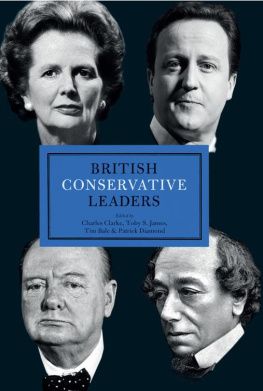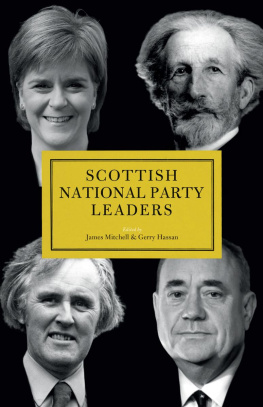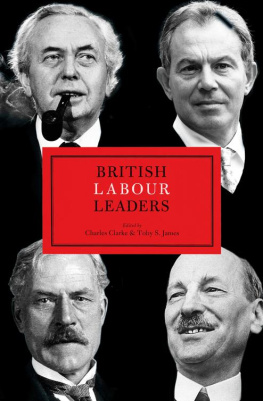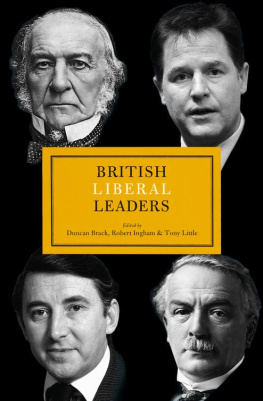T his book arises from a collaboration between the University of East Anglia and Queen Mary University of London, designed to focus upon issues in political leadership. The project has been supported by the political leadership sub-group of the Political Studies Association.
It began with a seminar at UEA on 17 January 2014, entitled Political Leadership and Statecraft in Challenging Times. This was then followed by a seminar on Labour leaders, from Keir Hardie to Gordon Brown, on 28 June 2014 at UEA London, and then by a symposium on Conservative leaders, from Stanley Baldwin to David Cameron, on 5 December 2014 at Queen Marys east London campus.
The purpose of all these was to think about how we can assess party leaders and what it takes to be a successful leader, and then to evaluate who has been more, or less, successful. The seminars were an essential part of the background to this book and we are grateful to Hussein Kassim, Lee Marsden, Nansata Yakubu, Catrina Laskey and Natalie Mitchell for helping to make them a success. The assistance of Marlon Gomes and Mark Byrne at Queen Mary is greatly appreciated, along with all who came along and contributed to what was a stimulating event on Conservative leadership in December. Alan Wager acted as the principal researcher on the project, demonstrating diligence and commitment throughout. His contribution to the book has simply been enormous.
We would particularly like to thank the biographers and chroniclers of the political leaders, who contributed to the seminars and who have written the chapters in this book. Their commitment has made the whole project possible and the standard of their contribution has been outstanding. Equally, the thoughts, reflections and time of William Hague and Lord Howard were greatly appreciated. Bringing the transcripts of their interviews together would not have been possible without the help of Josh Gray and Sophie Moxon.
This book, British Conservative Leaders, has a companion, British Labour Leaders, which has been edited by Charles Clarke and Toby James. Duncan Brack and colleagues from the Liberal History Group have edited a further volume, British Liberal Leaders, with contributions from Charles and Toby that set out a similar path towards understanding statecraft. We believe that the three books together make an important contribution to the study of political leadership in Britain.
We would like to thank Iain Dale and Olivia Beattie at Biteback, who have been a pleasure to work with as we have brought this book towards publication.
Charles Clarke, Toby S. James, Tim Bale and Patrick Diamond
London and Norwich, June 2015
MATTHEW DANCONA is an award-winning journalist and influential political commentator. Formerly editor of The Spectator and deputy editor of the Sunday Telegraph, he is a columnist for The Guardian, the Evening Standard, the International New York Times and GQ. His recent book In It Together: The Inside Story of Coalition Government described the politics of the coalition government, with unrivalled access to many of the key players. He is a visiting research fellow at Queen Mary University of London, chair of Bright Blue (the independent think tank that promotes liberal conservatism), and a trustee of the Science Museum.
TIM BALE graduated from Gonville & Caius College, Cambridge, completed a Masters at Northwestern University and earned his PhD from Sheffield. He specialises in political parties and elections in the UK and Europe. Tims media work includes writing for the Financial Times, The Guardian, the Telegraph and The Observer. He has also appeared on various radio and television programmes to talk about politics. In 2011, he received the Political Studies Associations W. J. M. Mackenzie Book Prize for The Conservative Party from Thatcher to Cameron. He has since published The Conservatives Since 1945: The Drivers of Party Change, the third edition of European Politics: A Comparative Introduction, and Five-Year Mission: The Labour Party Under Ed Miliband.
STUART BALL is professor of modern British history at the University of Leicester. He has published extensively on the history of the Conservative Party in the twentieth century, and his most recent books are Dole Queues and Demons: British Election Posters from the Conservative Party Archive, Portrait of a Party: The Conservative Party in Britain 19181945, and ConservativePolitics in National and Imperial Crisis: Letters from Britain to the Viceroy of India 19261931. He has also edited, with Anthony Seldon, Conservative Century: The Conservative Party since 1900 and Recovering Power: The Conservatives in Opposition since 1867.
JIM BULLER is a senior lecturer in politics at the University of York. He has a PhD from the University of Sheffield and has previously worked in the department of political science and international studies at the University of Birmingham. He has written widely on the subject of British politics and public policy, including recent articles in the New Political Economy, British Journal of Politics and International Relations, West European Politics, Contemporary European Politics and British Politics. He has recently co-edited a special issue of Parliamentary Affairs on Assessing Political Leadership in Context British Party Leadership During Austerity. He is also chair of the PSA Anti-Politics and Depoliticisation Specialist Group.
JOHN CAMPBELL is a British political writer and biographer. He is a graduate of the University of Edinburgh. His works include biographies of F. E. Smith, Aneurin Bevan, Edward Heath and Margaret Thatcher the last consisting of two volumes, The Grocers Daughter and The Iron Lady. He was awarded the NCR Book Award for his biography of Heath in 1994. He has also written If Love Were All The Story of Frances Stevenson & David Lloyd George and Pistols At Dawn: Two Hundred Years of Political Rivalry from Pitt & Fox to Blair & Brown. His most recent book is the official biography Roy Jenkins: A Well-Rounded Life, which won Political Biography of the Year at the Political Book Awards, and was shortlisted for the 2014 Samuel Johnson Prize.
JOHN CHARMLEY is professor of history at the University of East Anglia, where he is head of the Interdisciplinary Institute for the Humanities. He is the author of nine books, including Churchill: The End of Glory and A History of Conservative Politics since 1832.
CHARLES CLARKE was Member of Parliament for Norwich South from 1997 to 2010. He served as Education Minister from 1998 and then in the Home Office from 1999 to 2001, before joining the Cabinet as Minister without Portfolio and Labour Party chair. From 2002 to 2004, he was Secretary of State for Education and Skills, and then Home Secretary until 2006. Charles was previously chief of staff to Leader of the Opposition Neil Kinnock. He now holds visiting professorships at the University of East Anglia, Lancaster University and Kings College London, and works with educational organisations internationally. He edited The Too Difficult Box and co-edited British Labour Leaders.
MARK DAVIES holds a Masters degree in history from Cambridge University, and a Masters degree in law from University College London.
PATRICK DIAMOND is a public policy lecturer at Queen Mary University of London, a visiting fellow at Kellogg College, Oxford, and an associate member of Nuffield College. He is also a local councillor in the London Borough of Southwark, and vice-chair of the think tank Policy Network. He is the former head of policy planning at 10 Downing Street. His recent books include









